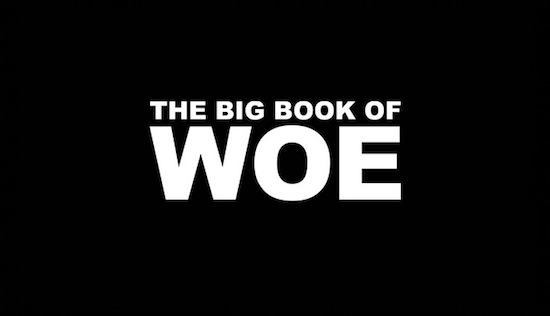Gothic Futurist
Stuart Argabright looks like a villain from a Die Hard film. He parts the staff in the bar we meet. They’ve been bitching at me to move on, and now tiptoe around. He addresses me with the ease and grace of someone not used to being messed with, his a demeanour of soft dread, part Southern Gent, part Austrian count. Perhaps it’s a result his army upbringing. His father worked for US Intelligence on the military’s precursor to the Internet, his brother on F-16’s. It’s difficult to know where to start with Argabright. History’s been bent out of shape with the post-punk revival. We’re supposed to be more interested in some chapters of his story more than others. He’s been ploughing the same furrow since he left Washington DC, and his early band The Rudiments (captured on the obscure 30 Seconds over DC Compilation with other punk contenders like the Slickee Boys), and left for New York under the spell of Tom Verlaine’s Television.
I had propped a copy of the Dominatrix record ‘The Dominatrix Sleeps Tonight’ (Streetwise/upRoar 1984) on my table. We’d failed to work out beforehand how to identify one another. I reasoned it’s lurid pink sleeve would catch his eye, then it seemed a valid entry point for our conversation. Argabright is heartily sick of the track: “Dominatrix was the anomaly in my scheme of things, but if most people know me at all, they think of that record.” Having been released recently on Andy Weatherall’s Nine O’Clock Drop (Nuphonic 2000) and at least 4 other compilations previous to that, it’s just been put out again, in the original sleeve with accompanying re-mixes, by DJ Hell’s International Gigolo label. It’s perky chiming synth riff, crisp drums and playful lyrics made it a surprise hit for Stuart in the mid-eighties. He ended up playing it for the disco crowd at Studio 54 and the Paradise Garage wedged between Robert “D.A.F” Gorl and Run DMC. This was ironic turn of events. The crowd Stuart emerged from HATED the disco scene and it’s “…frivolous mirror ball sensibility.” It’s easy to forget that despite today’s re-imagining of that era, disco and punk were sworn enemies, with the Mudd Club and it’s progeny structuring themselves as a response to the 9-5 Weekender attitude of the disco crowd. We’re soon to be treated to the first bonafide history of the era at the hands of New York-based Academic Simon Reynolds’ eagerly anticipated Post-Punk book. “None of the disco people went to The Mudd Club. You got the Bianca Jaggers thrown in once in a while, but if we saw those people we’d trip ’em up, kick ’em, and if they came dressed all disco James Chance might just mug them on the dancefloor. The strata of people was pretty pronounced. When you say Disco people I think Studio 54 people, that was a whole tribe of people. More power to them, but it jusn’t wasn’t our scene.” With Dominatrix he was trying to engineer transgression, not homogeneity: “Its good to have boundaries because then you can say “this” and “this” get together, and its not just a pool of musicians.” This boundary breaking was echoed in the track’s subject matter. “I’d been hanging out with Dominatrixes, they were my good friends. I wanted to do a thing which showed what they were about…these women in power who were beating and peeing on the top music business lawyers in New York.” Stuart clearly in awe of these girls and the down-up inversion of power they practised.
“We were working at Unique studios, which was the hot studio at the time, by Times Square”, The group had laid their hands on Peter Baumann’s studio (of Tangerine Dream, interesting for his Skin Diver record with Nona Hendryx) the synth, mixer and podium made for Kraftwerk. “While me and Ken Lockie were in there doing the record Ivan Ivan the co-producer was out playing video games in the hallway and in the next studio was Arthur Baker… Arthur was like "What’s this record? I gotta have it!" The record at that point was being produced by Joel Weber’s upRoar recordings, Weber the man behind the hot music biz conference of the day the NMS, but a deal was struck and Dominatrix consequently came out as a joint Street Wise and upRoar production. In a depressingly familiar scenario Stuart never managed to properly collect for the record, a grim parallel could be made with Liquid Liquid’s treatment at the hands of that other R’n’B empire Sugarhill. He doesn’t have a nice word to say about Arthur Baker.
Ike Yard was the foundation for all this activity. The group was put together by Argabright (Drums) and Kenny Compton (Bass). These two spent months locking patterns before inviting electronics wizards Fred Szymanski and Michael Diekmann on board. With the “Night after Night" EP (Les Disques Crepuscule 1981), they made a cultural leap by being on the forward-looking Belgian label, as opposed to a homegrown NYC one. The only similar deal centred on transatlantic Post-punk axis was brokered between Ed Bahlmann (99) and London’s Dick O’Dell (Y) yet never bore fruit in the export to Europe of New York’s Music. Ike Yard were trailblazers. There were predecessors mining similar sonic territory (Suicide) and contemporaries (Liquid Liquid and Gray) but Ike Yard upped the ante in the abstract ferocity of their sound. Their true musical kindred spirits were German; D.A.F. and bands on the Atatak label like Der Plan and Pyrolator. Argabright was keen to point out that their “angle” came as much from literature, notably from J.G.Ballard’s Crash, from Japanese author Ryu Murakami (especially his novel Almost Transparent, which was the inspiration for the lyrics of ‘Half A God’), and William Burroughs “..for his cut-up technique.” It’s music which speaks of the intense alienation of cold water flats in the Lower East Side, seductive in its frosty hauteur but also plying hefty rhythmic ebb.

With their second record A Fact A Second (Factory 1982) Ike Yard were delighted to be on the same label as Joy Division. This time Fred Szymanski and Michael Diekmann, both of whom had an academic background in electronics, truly made their influence felt. Argabright recalls his introduction to Xenakis and Stockhausen and the electronic music issuing from IRCAM at their hands: “We bathed in it”. Argabright describes the nascent electronics scene: “Here in Manhattan there was this place called PASS, Public Access Synthesiser Studio, where you could go for $3 an hour and there was this synthesiser, a Buchla which was as tall as this wall. A phone patchbay thing which took you half an hour to get any sound out of it. Then came the suitcase sized EMS synthesiser which Brian Eno had, but also that Fred in Ike Yard owned. Suddenly we were able to have a thing we could walk around with…and wow we can set this thing on top of an old ironing-board on stage and we can do a live thing with it. OK!” A Fact A Second” sports a “purely electronic” sound with synths and drum machines all triggered through midi. Tracks like ‘Loss’ and ‘NCR’, the latter audible on Gomma’s excellent Anti-NY (Gomma 2001) compilation, are quite stunning not just for their whispering iciness, but also their low-slung electro-funk. Suicide, who Ike Yard had also supported (others included New Order, A Certain Ratio, Young Marble Giants, Non, and Lydia Lunch’s 13.13), may have been prodigally in advance, but possessed an unmistakable rockabilly sound. Hearing what Argabright terms these “ones of a kind” of Post-Punk, is fascinating. Twenty years on this music is bang up to date, and it’s heartening to know that thanks to the Troubleman label, who recently brought us the hotly-tipped New Wave upgrade of Erase Errata, both these Ike Yard records will imminently be available once more. As a footnote to this era, note the impact Ike Yard and Dominatrix may have had over the birth of New Order’s ‘Blue Monday’: “Factory America’s Michael Shamberg was always hanging around the scene and making connections. With Dominatrix on Street Wise, it was just a jump away in the club to go from talking to the Street Wise guy (Baker) to the New Order guy (Tony Wilson). I would venture to say that in whatever vaporous way the connection with Ike Yard and Factory, and Ike Yard and Arthur Baker somewhat smoothed the way for the New Order Arthur Baker thing.”
Gomma, who also reissued ‘Exterior Street,’ Stuart’s collaboration with Rammelzee which came out on Death Comet Crew’s At the Marble Bar EP (Beggars Banquet 1984) have just, after Argabright’s suggestion, put out Rammelzee’s first LP. “Ramm”, as Stuart affectionately refers to his colleague, and he have forged a persistent collaboration since that record. It’s an unusual partnership, founded on their mutual “Gothic Futurist” aesthetic. They first met at The Gallery in Berlin in 1983. Argabright had fled New York after being stabbed twice in a mugging. Since then Rammelzee has also contributed to two tracks on Stuart’s Black Reign record on the Industrial Label 5th Column in 1986. Argabright has taken the role of producer in the project; he’s recorded all the vocals in New York with Rammelzee, Shock Dell and K-Rob (the first time they’ve worked together since ‘Beat Bop’). He has marshalled contributions from the German Hip-Hop crews Quanuum and Terranova and added his own production on one of the tracks. He’s aiming to help “Ramm” on tour, as the Ikonoklast Panzerist can often have his plate full when performing in his beautiful trash assemblage outfits. Stuart joked: “Ikonoklast Panzerism, a great buzzword unless your talking to Jewish toymakers….he was trying to get his toys out there and people were all excited and he went "Gothic Futurism and…Ikonoklast Panzerism" Jaws drop, eyes bug out. "What do you mean by Panzerism?" End of meeting!” Not that it’s his place to apologise for his friend’s iconography, but Argabright is quick to explain the phrase has nothing to do with “the forties”. A remix by El-P of the original Death Comet Crew record, whose lovely vintage 3D cover Stuart and I fauned at over at his apartment, is also mooted. Stuart holds the Def Jux crew in high esteem, and also singled out the No-U Turn Tech-step label for praise.

Argabright has been busy with a consistently inspiring stream of activity between these earlier records and the current offerings. Amongst other things he’s been heavily involved with the author William Gibson, who he contacted the week after Neuromancer’s release, telling the soon-to-celebrated cyber-punk that HIS music was the soundtrack to that book. Highlights of this partnership include Stuart being asked to do the music for the 10th Anniversary Audio Book of Neuromancer by Time Warner in 1994, and his score for the Robert Longo/William Gibson movie “Johnny Mnemonic” (“a bust”). His improbable avant-thrash outfit Black Reign who mixed The Misfit’s three minute pop songs with equal parts Einsturzende Neubauten metal-work pounding played GG Allin’s last concert and the notorious anniversary of the Tompkins Square Riots at Tompkins Square Park, surrounded by a phalanyx of police. Yesterday he was the on the phone to Bachir of The Master Musicians of Jajouka with whom he is co-ordinating a project with Judy Nylon, another long-term collaborator. This is the kind of restless activity it’s heartening to see in an old dude. On our way to his flat, in the mysteriously perfect Stuyvesant Park public housing estate, Stuart described his vision of electronic music: “…I envision a cable jerking around spraying out sparks” danger, in a word. It’d be good to see more threat of rupture in some of the smooth surfaces of modern electronica.
Special Thanks to Paul Kennedy.
The Big Book of Woe is out now, published as an e-book by Hollow Earth


